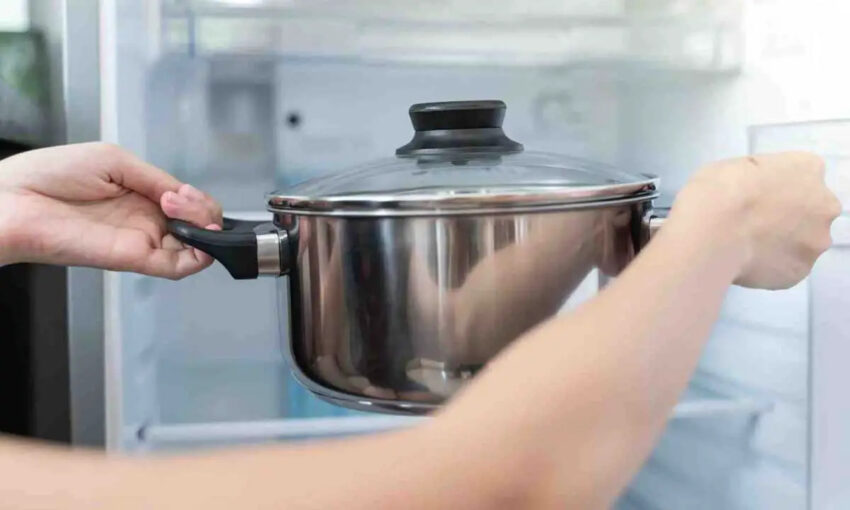
01 Jun Why Shouldn’t You Put Metal in the Fridge
Metal objects are commonly found in our kitchens, but caution should be exercised when storing them in the fridge. While the refrigerator is vital for keeping our food fresh, it is not an ideal environment for metals. In this article, we will explore why shouldn’t you put metal in the fridge, the potential risks involved, and alternative storage options for your metallic items.
The refrigerator is a cornerstone of modern kitchens, providing a controlled environment that helps keep our perishable items safe and fresh. However, it is essential to understand that the refrigerator’s interior conditions are unsuitable for storing metal objects. Despite metal’s durability and versatility, the cold and humid environment inside a fridge can lead to various problems when the metal comes into contact with it.
Understanding the Refrigerator Environment

Image source: Google.com
Before delving into the risks of placing metal in the fridge, it’s important to understand the environment inside a refrigerator. Typically, refrigerators operate at temperatures between 35°F (1.6°C) and 45°F (7.2°C) to inhibit bacterial growth and slow down food spoilage. Additionally, refrigerators maintain high humidity to prevent food from drying out.
When you place metal objects in the fridge, such as utensils or containers, there are a few factors to consider. First, metal is an excellent conductor of heat, so if the metal objects are at room temperature or warmer when placed in the fridge, they can initially absorb some of the coldness from the environment. This can temporarily affect the temperature inside the refrigerator, making the fridge compressor starts then stop more frequently as it tries to maintain the set temperature.
Potential Risks of Putting Metal in the Fridge
Formation of Condensation
When metal objects enter the refrigerator, they often have a different temperature than the surrounding air. As a result, condensation can form on the metal surface due to the temperature difference. This condensation promotes the accumulation of moisture, leading to potential problems such as rust and corrosion.
Possibility of Rust and Corrosion
Refrigerators provide a moist environment, and when metal objects are exposed to moisture for prolonged periods, they become vulnerable to rust and corrosion. Rust affects the appearance of metal items and compromises their structural integrity. Corrosion, on the other hand, can result in the release of harmful substances that contaminate food or beverages stored nearby.
Impact on Food Safety
Storing metal objects directly with food or beverages in the fridge can pose risks to food safety. Chemical reactions between certain metals and acidic or alkaline foods can occur, leading to the leaching of metal ions into the food. This can alter the stored items’ taste, quality, and safety.
Risk of Damaging the Refrigerator
Metal objects, especially those with sharp edges or protrusions, can potentially damage the interior surfaces of the refrigerator. Scratches or dents can compromise the insulation and efficiency of the appliance, affecting its overall performance and lifespan.
Effects on Food and Beverages
When metal comes into contact with food or beverages in the fridge, various reactions can occur, potentially affecting their quality and safety.
Chemical Reactions with Metal Containers
Certain metals, such as aluminum or copper, can react with acidic foods like citrus fruits or tomato-based products. This reaction can alter the taste of the food and cause undesirable color changes. Using appropriate non-reactive containers, such as glass or food-grade plastic, is recommended for acidic or alkaline foods.
Changes in Taste and Quality
Metal containers or utensils can impart metallic flavors and odors to the food. These flavors can be particularly noticeable in sensitive foods or beverages, such as dairy products or wine. To ensure optimal taste and quality, it’s advisable to use designated food-grade containers made from materials that won’t affect the flavor.
Contamination Risks
If metal objects are not properly cleaned or stored in the fridge, they can accumulate dirt, bacteria, or other contaminants. These contaminants can transfer to nearby food, posing health risks when consumed. Ensuring proper hygiene and storage practices for metal items is crucial to prevent contamination.
Impact on Energy Efficiency
Placing metal objects in the fridge can also affect the appliance’s energy efficiency and performance.
Influence on Temperature Regulation
When metal objects occupy space inside the fridge, they can disrupt the airflow and temperature distribution. This can lead to uneven cooling, forcing the refrigerator’s compressor to work harder to maintain the desired temperature. As a result, the appliance consumes more energy, leading to higher electricity bills.
Increased Energy Consumption
The additional workload on the refrigerator’s cooling system due to metal objects can increase energy consumption. Over time, this affects the environment and leads to higher energy costs for the household.
Overworking the Refrigerator’s Cooling System
Refrigerators are designed to cool and preserve food efficiently within a specified range. The presence of metal objects can interfere with the fridge’s cooling system, causing it to overwork and potentially leading to premature wear and tear. This can result in the refrigerator requiring repairs or replacement sooner than expected.
Safety Hazards
In addition to the potential risks to food and energy efficiency, placing metal in the fridge can create safety hazards.
Risk of Electric Shocks
If metal objects come into contact with live electrical parts within the refrigerator, there is a risk of electric shocks. Accidentally touching exposed wires or electrical components while handling metal items can be dangerous and lead to injuries.
Potential Damage to Electrical Components
The presence of metal objects in the fridge increases the likelihood of accidental contact with electrical components. Such contact can cause short circuits, damage the refrigerator’s electrical system, and render the appliance inoperable.
Fire Hazards
Although rare, certain metallic objects, such as aluminum foil or containers with metallic coatings, can act as conductors and potentially cause fires if they come into contact with live electrical parts. It’s crucial to avoid placing any metal items near electrical connections or exposed wiring within the refrigerator.
Best Practices for Refrigerator Use
To ensure the optimal performance of your refrigerator and the safety of your stored items, it’s important to follow these best practices:
- Use Appropriate Storage Containers: Opt for non-reactive glass or food-grade plastic containers to store acidic or alkaline foods.
- Consider Alternative Materials for Refrigeration: Explore alternative storage options for metals, such as keeping them in designated drawers or cabinets outside the fridge.
- Handle Metal Objects Safely: When handling metal items in the kitchen, be cautious not to place them in the fridge or near electrical connections accidentally.
- Regularly Clean and Maintain the Fridge: Keep your refrigerator clean, removing spills or residues that can attract dirt or bacteria. Additionally, perform routine maintenance to ensure the appliance’s optimal performance.
- Follow Manufacturer’s Guidelines: Refer to the refrigerator’s user manual for specific recommendations and guidelines regarding storage and maintenance.
Alternative Storage Options for Metal Items
If you have metal items that require storage but aren’t suitable for the fridge, consider these alternative options:
- Designated Drawers or Cabinets: Allocate specific drawers or cabinets in your kitchen for storing metal objects safely. Ensure these areas are clean, dry, and away from direct sunlight or excessive humidity.
- Hanging Racks or Hooks: Utilize hanging racks or hooks to store metal utensils, such as pots, pans, or cooking tools, in a convenient and accessible manner.
- Non-Refrigerated Storage Containers: For non-perishable metal items like tools or spare parts, use labeled storage containers or boxes to keep them organized and easily accessible.
- Magnetic Strips or Boards: Attach magnetic strips or boards to your kitchen walls to store metal items like knives or small tools, providing easy access while saving valuable drawer or cabinet space.
Common Misconceptions
There are several misconceptions surrounding the topic of placing metal in the fridge. Let’s address and debunk some of these misconceptions:
- Myth: Aluminum foil helps keep food fresher in the fridge.
- Fact: While aluminum foil can be used to cover or wrap food, it should not be placed in direct contact with acidic or salty foods, as it can react and affect the taste or quality.
- Myth: Storing canned food in the refrigerator is safe.
- Fact: Canned food is already preserved and does not require refrigeration unless opened. Once opened, transferring the contents to a non-metallic container and refrigerating is recommended.
- Myth: Leaving a metal spoon in the fridge has no consequences.
- Fact: Leaving a metal spoon in the fridge can potentially cause damage to the appliance, and it’s advisable to remove it promptly to avoid any risks.
- Myth: Keeping metal pots and pans in the refrigerator is safe.
- Fact: While metal pots and pans are typically safe for storing in the fridge, they can occupy valuable space and affect temperature distribution. It’s often more practical to store them in designated cabinets or racks.
- Myth: Placing a stainless steel water bottle in the fridge is harmless.
- Fact: Stainless steel water bottles are generally safe for refrigeration, but it’s essential to ensure proper hygiene and avoid prolonged storage to maintain optimal water quality.
Conclusion
While the refrigerator serves as an excellent tool for preserving food, it’s important to understand that metal objects are unsuitable for storage in this environment. The risks of condensation, rust, corrosion, impact on food safety, energy efficiency, and safety hazards outweigh the convenience of placing metal in the fridge.
You may like to read How to Spray Paint Bathroom Fixtures


Sorry, the comment form is closed at this time.